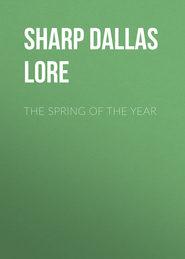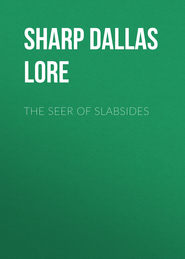По всем вопросам обращайтесь на: info@litportal.ru
(©) 2003-2024.
✖
The Face of the Fields
Настройки чтения
Размер шрифта
Высота строк
Поля
Yet the analogy only half holds. Memories of the most tenacious kind the animals surely have; but little or no voluntary, unaided power to use them. Memory is largely a mechanical, a crank process with the animals, a kind of magic-lantern show, where the concrete slide is necessary for the picture on the screen; else the past as the future hangs a blank. The dog will sometimes seem to cherish a grudge; so will the elephant. Some one injures or wrongs him, and the huge beast harbors the memory, broods it, and waits his opportunity for revenge. Yet the records of these cases usually show the creature to be living with the object of his hatred – keeper or animal – and that his memory goes no further back than the present moment, than the sight of the enemy; memory always taking an immediate, concrete shape.
At my railroad station I frequently see a yoke of great sleepy, bald-faced oxen, that look as much alike as two blackbirds. Their driver knows them apart; but as they stand there bound to one another by the heavy bar across their foreheads, it would puzzle anybody else to tell Buck from Berry. But not if he approach them wearing an overcoat. At sight of me in an overcoat the off ox will snort and back and thresh about in terror, twisting the head of his yoke-fellow, nearly breaking his neck, and trampling him miserably. But the nigh ox is used to it. He chews and blinks away placidly, keeps his feet the best he can, and doesn’t try to understand at all why great-coats should so frighten his cud-chewing brother. I will drop off my coat and go up immediately to smooth the muzzles of both oxen, blinking sleepily while the lumber is being loaded on.
Years ago, the driver told me, the off ox was badly frightened by a big woolly coat, the sight or smell of which suggested to the creature some natural enemy, a panther, perhaps, or a bear. The memory remained, but beyond recall except in the presence of its first cause, the great-coat.
To us, and momentarily to the lower animals, no doubt, there is a monstrous, a desperate aspect to nature – night and drouth and cold, the lightning, the hurricane, the earthquake: phases of nature that to the scientific mind are often appalling, and to the unthinking and superstitious are usually sinister, cruel, personal, leading to much dark talk of banshees and of the mysteries of Providence – as if there were still necessity to justify the ways of God to man! We are clutched by these terrors even as the junco was clutched in my goblin hand. When the mighty fingers open, we zigzag, dazed from the danger; but fall to planning, before the tremors of the earth have ceased, how we can build a greater and finer city on the ruins of the old. Upon the crumbled heap of the second Messina the third will rise, and upon that the fourth, unless the quaking site is forever swallowed by the sea. Terror can kill the living, but it cannot hinder them from forgetting, or prevent them from hoping, or, for more than an instant, stop them from doing. Such is the law of being – the law of the Jungle, of Heaven, of my pastures, of myself, and of the little junco. The light of the sun may burn out, motion may cease, matter vanish away, and life come to an end; but so long as life continues it must continue to assert itself, to obey the law of being – to multiply and replenish the earth, and rejoice.
Life, like Law and Matter, is all of one piece. The horse in my stable, the robin, the toad, the beetle, the vine in my garden, the garden itself, and I together with them all, come out of the same divine dust; we all breathe the same divine breath; we have our beings under the same divine law; only they do not know that the law, the breath, and the dust are divine. If I do know, and yet can so readily forget such knowledge, can so hardly cease from being, can so eternally find the purpose, the hope, the joy of life within me, how soon for them, my lowly fellow mortals, must vanish all sight of fear, all memory of pain! And how abiding with them, how compelling, the necessity to live! And in their unquestioning obedience what joy!
The face of the fields is as changeful as the face of a child. Every passing wind, every shifting cloud, every calling bird, every baying hound, every shape, shadow, fragrance, sound, and tremor, are so many emotions reflected there. But if time and experience and pain come, they pass utterly away; for the face of the fields does not grow old or wise or seamed with pain. It is always the face of a child, – asleep in winter, awake in summer, – a face of life and health always, if we will but see what pushes the falling leaves off, what lies in slumber under the covers of the snow; if we will but feel the strength of the north wind, and the wild fierce joy of the fox and hound as they course the turning, tangling paths of the woodlands in their race with one another against the record set by Life.
II
TURTLE EGGS FOR AGASSIZ
IT is one of the wonders of the world that so few books are written. With every human being a possible book, and with many a human being capable of becoming more books than the world could contain, is it not amazing that the books of men are so few? And so stupid!
I took down, recently, from the shelves of a great public library, the four volumes of Agassiz’s “Contributions to the Natural History of the United States.” I doubt if anybody but the charwoman, with her duster, had touched those volumes for twenty-five years. They are an excessively learned, a monumental, an epoch-making work, the fruit of vast and heroic labors, with colored plates on stone, showing the turtles of the United States, and their embryology. The work was published more than half a century ago (by subscription); but it looked old beyond its years – massive, heavy, weathered, as if dug from the rocks. It was difficult to feel that Agassiz could have written it – could have built it, grown it, for the laminated pile had required for its growth the patience and painstaking care of a process of nature, as if it were a kind of printed coral reef. Agassiz do this? The big, human, magnetic man at work upon these pages of capital letters, Roman figures, brackets, and parentheses in explanation of the pages of diagrams and plates! I turned away with a sigh from the weary learning, to read the preface.
When a great man writes a great book he usually flings a preface after it, and thereby saves it, sometimes, from oblivion. Whether so or not, the best things in most books are their prefaces. It was not, however, the quality of the preface to these great volumes that interested me, but rather the wicked waste of durable book-material that went to its making. Reading down through the catalogue of human names and of thanks for help received, I came to a sentence beginning: —
“In New England I have myself collected largely; but I have also received valuable contributions from the late Rev. Zadoc Thompson of Burlington; … from Mr. D. Henry Thoreau of Concord; … and from Mr. J. W. P. Jenks of Middleboro’.” And then it hastens on with the thanks in order to get to the turtles, as if turtles were the one and only thing of real importance in all the world.
Turtles no doubt are important, extremely important, embryologically, as part of our genealogical tree; but they are away down among the roots of the tree as compared with the late Rev. Zadoc Thompson of Burlington. I happen to know nothing about the Rev. Zadoc, but to me he looks very interesting. Indeed, any reverend gentleman of his name and day who would catch turtles for Agassiz must have been interesting. And as for D. Henry Thoreau, we know he was interesting. The rarest wood-turtle in the United States was not so rare a specimen as this gentleman of Walden Woods and Concord. We are glad even for this line in the preface about him; glad to know that he tried, in this untranscendental way, to serve his day and generation. If Agassiz had only put a chapter in his turtle book about it! But this is the material he wasted, this and more of the same human sort; for the “Mr. J. W. P. Jenks of Middleboro’” (at the end of the quotation) was, some years later, an old college professor of mine, who told me a few of the particulars of his turtle contributions, particulars which Agassiz should have found a place for in his big book. The preface, in another paragraph, says merely that this gentleman sent turtles to Cambridge by the thousands – brief and scanty recognition! For that is not the only thing this gentleman did. On one occasion he sent, not turtles, but turtle eggs to Cambridge —brought them, I should say; and all there is to show for it, so far as I could discover, is a sectional drawing of a bit of the mesoblastic layer of one of the eggs!
Of course, Agassiz wanted to make that mesoblastic drawing, or some other equally important drawing, and had to have the fresh turtle egg to draw it from. He had to have it, and he got it. A great man, when he wants a certain turtle egg, at a certain time, always gets it, for he gets some one else to get it. I am glad he got it. But what makes me sad and impatient is that he did not think it worth while to tell about the getting of it, and so made merely a learned turtle book of what might have been an exceedingly interesting human book.
It would seem, naturally, that there could be nothing unusual or interesting about the getting of turtle eggs when you want them. Nothing at all, if you should chance to want the eggs as you chance to find them. So with anything else, – good copper stock, for instance, if you should chance to want it, and should chance to be along when they chance to be giving it away. But if you want copper stock, say of C & H quality, when you want it, and are bound to have it, then you must command more than a college professor’s salary. And likewise, precisely, when it is turtle eggs that you are bound to have.
Agassiz wanted those turtle eggs when he wanted them – not a minute over three hours from the minute they were laid. Yet even that does not seem exacting, hardly more difficult than the getting of hen eggs only three hours old. Just so, provided the professor could have had his private turtle-coop in Harvard Yard; and provided he could have made his turtles lay. But turtles will not respond, like hens, to meat-scraps and the warm mash. The professor’s problem was not to get from a mud turtle’s nest in the back yard to the table in the laboratory; but to get from the laboratory in Cambridge to some pond when the turtles were laying, and back to the laboratory within the limited time. And this, in the days of Darius Green, might have called for nice and discriminating work – as it did.
Agassiz had been engaged for a long time upon his “Contributions.” He had brought the great work nearly to a finish. It was, indeed, finished but for one small yet very important bit of observation: he had carried the turtle egg through every stage of its development with the single exception of one – the very earliest – that stage of first cleavages, when the cell begins to segment, immediately upon its being laid. That beginning stage had brought the “Contributions” to a halt. To get eggs that were fresh enough to show the incubation at this period had been impossible.
There were several ways that Agassiz might have proceeded: he might have got a leave of absence for the spring term, taken his laboratory to some pond inhabited by turtles, and there camped until he should catch the reptile digging out her nest. But there were difficulties in all of that – as those who are college professors and naturalists know. As this was quite out of the question, he did the easiest thing – asked Mr. Jenks of Middleboro’ to get him the eggs. Mr. Jenks got them. Agassiz knew all about his getting of them; and I say the strange and irritating thing is, that Agassiz did not think it worth while to tell us about it, at least in the preface to his monumental work.
It was many years later that Mr. Jenks, then a gray-haired college professor, told me how he got those eggs to Agassiz.
“I was principal of an academy, during my younger years,” he began, “and was busy one day with my classes, when a large man suddenly filled the doorway of the room, smiled to the four corners of the room, and called out with a big, quick voice that he was Professor Agassiz.
“Of course he was. I knew it, even before he had had time to shout it to me across the room.
“Would I get him some turtle eggs? he called. Yes, I would. And would I get them to Cambridge within three hours from the time they were laid? Yes, I would. And I did. And it was worth the doing. But I did it only once.
“When I promised Agassiz those eggs I knew where I was going to get them. I had got turtle eggs there before – at a particular patch of sandy shore along a pond, a few miles distant from the academy.
“Three hours was the limit. From my railroad station to Boston was thirty-five miles; from the pond to the station was perhaps three or four miles; from Boston to Cambridge we called about three miles. Forty miles in round numbers! We figured it all out before he returned, and got the trip down to two hours, – record time: driving from the pond to the station; from the station by express train to Boston; from Boston by cab to Cambridge. This left an easy hour for accidents and delays.
“Cab and car and carriage we reckoned into our time-table; but what we didn’t figure on was the turtle.” And he paused abruptly.
“Young man,” he went on, his shaggy brows and spectacles hardly hiding the twinkle in the eyes that were bent severely upon me, “young man, when you go after turtle eggs, take into account the turtle. No! no! that’s bad advice. Youth never reckons on the turtle – and youth seldom ought to. Only old age does that; and old age would never have got those turtle eggs to Agassiz.
“It was in the early spring that Agassiz came to the academy, long before there was any likelihood of the turtles laying. But I was eager for the quest, and so fearful of failure, that I started out to watch at the pond fully two weeks ahead of the time that the turtles might be expected to lay. I remember the date clearly: it was May 14.
“A little before dawn – along near three o’clock – I would drive over to the pond, hitch my horse near by, settle myself quietly among some thick cedars close to the sandy shore, and there I would wait, my kettle of sand ready, my eye covering the whole sleeping pond. Here among the cedars I would eat my breakfast, and then get back in good season to open the academy for the morning session.
“And so the watch began.
“I soon came to know individually the dozen or more turtles that kept to my side of the pond. Shortly after the cold mist would lift and melt away, they would stick up their heads through the quiet water; and as the sun slanted down over the ragged rim of treetops, the slow things would float into the warm, lighted spots, or crawl out and doze comfortably on the hummocks and snags.
“What fragrant mornings those were! How fresh and new and unbreathed! The pond odors, the woods odors, the odors of the ploughed fields – of water-lily, and wild grape, and the dew-laid soil! I can taste them yet, and hear them yet – the still, large sounds of the waking day – the pickerel breaking the quiet with his swirl; the kingfisher dropping anchor; the stir of feet and wings among the trees. And then the thought of the great book being held up for me! Those were rare mornings!
“But there began to be a good many of them, for the turtles showed no desire to lay. They sprawled in the sun, and never one came out upon the sand as if she intended to help on the great professor’s book. The embryology of her eggs was of small concern to her; her Contribution to the Natural History of the United States could wait.
“And it did wait. I began my watch on the 14th of May; June 1st found me still among the cedars, still waiting, as I had waited every morning, Sundays and rainy days alike. June 1st was a perfect morning, but every turtle slid out upon her log, as if egg-laying might be a matter strictly of next year.
“I began to grow uneasy, – not impatient yet, for a naturalist learns his lesson of patience early, and for all his years; but I began to fear lest, by some subtle sense, my presence might somehow be known to the creatures; that they might have gone to some other place to lay, while I was away at the schoolroom.
“I watched on to the end of the first week, on to the end of the second week in June, seeing the mists rise and vanish every morning, and along with them vanish, more and more, the poetry of my early morning vigil. Poetry and rheumatism cannot long dwell together in the same clump of cedars, and I had begun to feel the rheumatism. A month of morning mists wrapping me around had at last soaked through to my bones. But Agassiz was waiting, and the world was waiting, for those turtle eggs; and I would wait. It was all I could do, for there is no use bringing a china nest-egg to a turtle; she is not open to any such delicate suggestion.
“Then came the mid-June Sunday morning, with dawn breaking a little after three: a warm, wide-awake dawn, with the level mist lifted from the level surface of the pond a full hour higher than I had seen it any morning before.
“This was the day. I knew it. I have heard persons say that they can hear the grass grow; that they know by some extra sense when danger is nigh. That we have these extra senses I fully believe, and I believe they can be sharpened by cultivation. For a month I had been brooding over this pond, and now I knew. I felt a stirring of the pulse of things that the cold-hearted turtles could no more escape than could the clods and I.
“Leaving my horse unhitched, as if he, too, understood, I slipped eagerly into my covert for a look at the pond. As I did so, a large pickerel ploughed a furrow out through the spatter-docks, and in his wake rose the head of an enormous turtle. Swinging slowly around, the creature headed straight for the shore, and without a pause scrambled out on the sand.
“She was about the size of a big scoop-shovel; but that was not what excited me, so much as her manner, and the gait at which she moved; for there was method in it and fixed purpose. On she came, shuffling over the sand toward the higher open fields, with a hurried, determined see-saw that was taking her somewhere in particular, and that was bound to get her there on time.
“I held my breath. Had she been a dinosaurian making Mesozoic footprints, I could not have been more fearful. For footprints in the Mesozoic mud, or in the sands of time, were as nothing to me when compared with fresh turtle eggs in the sands of this pond.
“But over the strip of sand, without a stop, she paddled, and up a narrow cow-path into the high grass along a fence. Then up the narrow cow-path, on all fours, just like another turtle, I paddled, and into the high wet grass along the fence.
“I kept well within sound of her, for she moved recklessly, leaving a trail of flattened grass a foot and a half wide. I wanted to stand up, – and I don’t believe I could have turned her back with a rail, – but I was afraid if she saw me that she might return indefinitely to the pond; so on I went, flat to the ground, squeezing through the lower rails of the fence, as if the field beyond were a melon-patch. It was nothing of the kind, only a wild, uncomfortable pasture, full of dewberry vines, and very discouraging. They were excessively wet vines and briery. I pulled my coat-sleeves as far over my fists as I could get them, and with the tin pail of sand swinging from between my teeth to avoid noise, I stumped fiercely but silently on after the turtle.
“She was laying her course, I thought, straight down the length of this dreadful pasture, when, not far from the fence, she suddenly hove to, warped herself short about, and came back, barely clearing me, at a clip that was thrilling. I warped about, too, and in her wake bore down across the corner of the pasture, across the powdery public road, and on to a fence along a field of young corn.
“I was somewhat wet by this time, but not so wet as I had been before wallowing through the deep dry dust of the road. Hurrying up behind a large tree by the fence, I peered down the corn-rows and saw the turtle stop, and begin to paw about in the loose soft soil. She was going to lay!
“I held on to the tree and watched, as she tried this place, and that place, and the other place – the eternally feminine! – But the place, evidently, was hard to find. What could a female turtle do with a whole field of possible nests to choose from? Then at last she found it, and whirling about, she backed quickly at it, and, tail first, began to bury herself before my staring eyes.
“Those were not the supreme moments of my life; perhaps those moments came later that day; but those certainly were among the slowest, most dreadfully mixed of moments that I ever experienced. They were hours long. There she was, her shell just showing, like some old hulk in the sand along shore. And how long would she stay there? and how should I know if she had laid an egg?
“I could still wait. And so I waited, when, over the freshly awakened fields, floated four mellow strokes from the distant town clock.
“Four o’clock! Why, there was no train until seven! No train for three hours! The eggs would spoil! Then with a rush it came over me that this was Sunday morning, and there was no regular seven o’clock train, – none till after nine.
“I think I should have fainted had not the turtle just then begun crawling off. I was weak and dizzy; but there, there in the sand, were the eggs! and Agassiz! and the great book! And I cleared the fence, and the forty miles that lay between me and Cambridge, at a single jump. He should have them, trains or no. Those eggs should go to Agassiz by seven o’clock, if I had to gallop every mile of the way. Forty miles! Any horse could cover it in three hours, if he had to; and upsetting the astonished turtle, I scooped out her round white eggs.
“On a bed of sand in the bottom of the pail I laid them, with what care my trembling fingers allowed; filled in between them with more sand; so with another layer to the rim; and covering all smoothly with more sand, I ran back for my horse.











